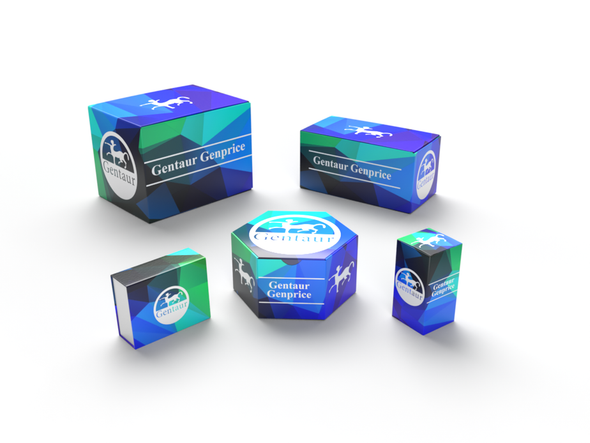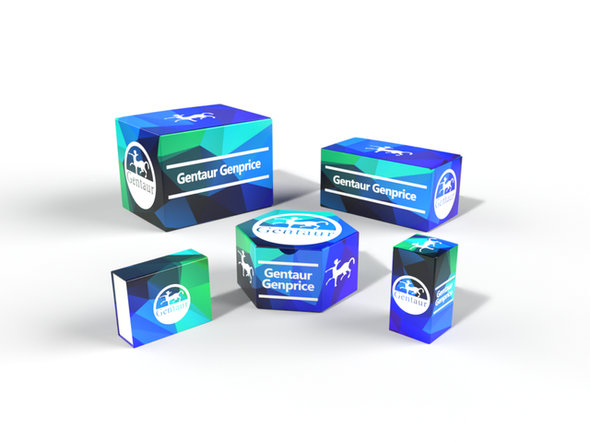749
Human Glycogen phosphorylase, brain form (PYGB) ELISA Kit | KTE61018
- SKU:
- 749-KTE61018
- Availability:
- Usually ships in 5 working days
Description
Human Glycogen phosphorylase, brain form (PYGB) ELISA Kit | KTE61018 | Gentaur UK, US & Europe Distribution
Application: This Human Glycogen phosphorylase, brain form (PYGB) ELISA Kit employs a two-site sandwich ELISA to quantitate PYGB in samples. An antibody specific for PYGB has been pre-coated onto a microplate. Standards and samples are pipetted into the wells and anyPYGB present is bound by the immobilized antibody. After removing any unbound substances, a biotin-conjugated antibody specific for PYGB is added to the wells. After washing, Streptavidin conjugated Horseradish Peroxidase (HRP) is added to the wells. Following a wash to remove any unbound avidin-enzyme reagent, a substrate solution is added to the wells and color develops in proportion to the amount of PYGB bound in the initial step. The color development is stopped and the intensity of the color is measured.
Detection Method: Colorimetric
Conjugate: N/A
Sample Type: Cell culture supernatants#Serum#Plasma#Other biological fluids
Assay Type: Multiple steps standard sandwich ELISA assay with a working time of 3-5 hours. It depends on the experience of the operation person.
Kit Component: • Human Glycogen phosphorylase, brain form microplate
• Human Glycogen phosphorylase, brain form standard
• Human Glycogen phosphorylase, brain form detect antibody
• Streptavidin-HRP
• Standard diluent
• Assay buffer
• HRP substrate
• Stop solution
• Wash buffer
• Plate covers
Features & Benefits: Human Glycogen phosphorylase, brain form (PYGB) ELISA Kit has high sensitivity and excellent specificity for detection of Human PYGB. No significant cross-reactivity or interference between Human PYGB and analogues was observed.
Calibration Range: Please inquire
Limit Of Detection: Please inquire
Usage Note: • Do not mix components from different kit lots or use reagents beyond the kit expiration date.
• Allow all reagents to warm to room temperature for at least 30 minutes before opening.
• Pre-rinse the pipet tip with reagent, use fresh pipet tips for each sample, standard and reagent to avoid contamination.
• Unused wells must be kept desiccated at 4 °C in the sealed bag provided.
• Mix Thoroughly is very important for the result. It is recommended using low frequency oscillator or slight hand shaking every 10 minutes.
• It is recommended that all samples and standards be assayed in duplicate or triplicate.
Storage Instruction: The unopened kit should be stored at 2 - 8°C. After opening, please store refer to protocols.
Shipping: Gel pack with blue ice.
Precaution The product listed herein is for research use only and is not intended for use in human or clinical diagnosis. Suggested applications of our products are not recommendations to use our products in violation of any patent or as a license. We cannot be responsible for patent infringements or other violations that may occur with the use of this product.
Background: PYGB is a new isozyme of glycogen phosphorylase (1, 4-D-glucan:orthosphosphate D-glucosyltransferase; EC 2.4.1.1) from a cDNA library prepared from a human brain astrocytoma cell line. Blot-hybridization analysis showed that the message is preferentially expressed in human brain, but is also found at a low level in human fetal liver and adult liver and muscle tissues. The protein sequence deduced from the nucleotide sequence was 862 amino acids long compared with 846 and 841 amino acids for the liver (PYGL) and muscle (PYGM) isozymes, respectively. The greater length of brain phosphorylase was found to be due entirely to an extension at the c-terminal portion of the protein. Muscle and brain isozymes shared greater similarities with each other than either did with the liver sequence.
Alternative Names: PYGB; MGC9213; brain glycogen phosphorylase; glycogen phosphorylase B
Search name: PYGB; MGC9213; brain glycogen phosphorylase; glycogen phosphorylase B
Tag: PYGB










